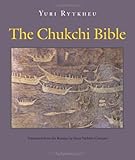These reviews are cross-posted from my Goodreads account.
The Chukchi Bible

This account of the myths and legends of the Chukchi people (a native Arctic tribe) is written by a contemporary Chukchi author, which sets it apart from a more anthropological narrative in some vital ways. Yuri Rytkheu is telling the history of his own family, and he claims the right to tell it in his own way–which in this case means with a rather modern narrative voice. Though the stories themselves may have been handed down through an oral tradition, this book was written: there’s none of the formulaic, repetitive cadences that you generally find when encountering narratives that are primarily designed for storytellers to memorize and repeat. Instead we are told what characters thought and felt and sensed in each moment, as with a modern novel.
Yet the stories are infused with a more ancient sensibility. There’s an easy interchange between the material and spiritual worlds, and between the animal and human realms. War and rape and murder happen, and are neither excused nor treated as anything particularly shocking. There’s euthanasia of the elderly, harsh treatment of children, and one act of human sacrifice (although that IS shocking, even to the people carrying out what they perceive to be a divine mandate). The most thrilling part of the book is Rytkheu’s account of the life of his grandfather, who traveled the world during the early twentieth century and witnessed the loss of the traditional Chukchi lifestyle at the hands of the Americans, Europeans and Soviets. Rytkheu doesn’t sentimentalize the often-brutal lives of his ancestors, but he’s clear-eyed about what the Chukchi have lost, and he brings that heritage brilliantly to life.
Bloody Fabulous

I bought this collection because it had a Zen Cho story in it, and while her piece (“The First Witch of Damansara”) is my favorite in the book, I enjoyed several of the others as well. As might be expected from a fashion-themed speculative fiction anthology, it’s heavy on the vampires, but there’s also fairies, ghosts, time-travelers, immortal children of an Aztec blood god, and acrobatic mathematicians. (I quite liked the acrobatic mathematicians.)
Washington Square

Spoiler alert!
Henry James is obviously an amazing stylist, and I love the way he excavates the thoughts and emotions of his characters. I love the way the conflict in his stories almost always comes from characters encountering the limits of their own natures, and how he explores the nature of true honor in a world of hypocrisy and sham propriety.
That said, sometimes I can only take James in small doses, and Washington Square exposes some of his more artificial and frustrating traits as a storyteller. I could believe in Catherine to a certain extent, and certainly found her quiet defiance of her overbearing father compelling, but the resolution of the situation seemed forced and hollow. After showing us a character of such unexpected depth and strength, James expects us to turn around and believe that she’s utterly broken forever? No, sorry, I feel pretty sure that the Catherine we met over the course of the book would have been able to find happiness with a John Ludlow. The final image of the spinster alone with her embroidery is meant to be striking, but I just found it false.














